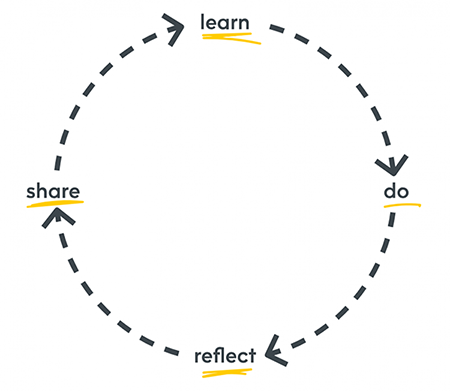| Leadership Development Model |

Leadership Development ModelMethodologies and mindsets to help you develop your leadership skills. Our beliefsGood leadership is essential for social change21st century social challenges require leaders who can meet the trials of a changing world. Everyone is a leaderLeadership is not restricted to those with a manager title, it’s for formal and informal leaders alike. The truth about leadership is that we're all doing it, but we're not all doing it to our full potential. Leadership is a lifelong journeyLeadership development is a lifelong journey. As our teams, organisations and challenges change, we need to change and evolve with them in order to have the impact we want to see. Social Leadership is a set of skills and behaviours we can all
develop.
Leaders grow leadersBy collaborating, supporting and challenging one another, leaders can have a collective impact across the social sector. Leadership development modelWe have developed an approach to leadership development gathered from ten years of working with some of the leading coaches and trainers in the field. Here we explain some of the methodologies and mindsets that we believe will help you develop your leadership skills and unlock your team’s potential to achieve more together.
Know Yourself, Be Yourself, Look After YourselfLeadership development must start with self-awareness. The most successful leaders critically assess their strengths, weaknesses, motivations and values. Leadership is tough, so it is also important to build physical and emotional resilience, and look after their own wellbeing so they can respond effectively to leadership challenges. Click on the inner circles to find out more. Assess ContextSocial sector ‘systems’ are rapidly changing. We live in a dynamic world that is transforming our workplaces, politics, ethics and communities. To meet these demands, social leaders need to understand the complexities of changing systems. They must also be aware of the challenges and opportunities that lie ahead to steer their teams and organisations, and make the most of what these changes offer. Click on the inner circles to find out more. Work With And Through OthersNo leader exists or succeeds in isolation. Social skills and empathy are required to inspire, motivate and empower others, whilst respecting diversity and celebrating the power that difference brings. Working with and through others involves collaborating, forming partnerships, as well as inspiring and growing other leaders, all while making a positive social impact. Click on the inner circles to find out more. 
Formal, social and experiential learningOur approach to learning and development is iterative. This means that participants go through the learning cycle, reflecting on how it went, sharing with the group and then applying the lessons for the next cycle. In their research, Centre of Creative Leadership shows the most effective leadership development happens according a 10-20-70 ratio.
Our online, face to face and blended programmes and courses incorporate different ways of learning for an engaging and effective learning experiences.
Social Leadership Capabilities Framework
Being a social and ethical leader require certain capabilities. The Social Leadership Capabilities Framework outlines the attributes, behaviours and skills required for successful social sector leadership. The Capabilities Framework illustrates how and what these skills and behaviours look like in action. Having a framework enables leaders to reflect and assess their current skills. It empowers them to identify leadership gaps and plan their personal and professional development.
Empowering Enabler
Click on another capability to find out more.
Focused Strategist
Click on another capability to find out more.
Passionate Advocate
Click on another capability to find out more.
Generous Collaborator
Click on another capability to find out more.
Courageous Changemaker
Click on another capability to find out more.
Inspirational Communicator
Click on another capability to find out more.
|
13/04/2026 » 08/05/2026
Discover Programme April 2026
18/05/2026 » 30/06/2026
Management Fundamentals May 2026